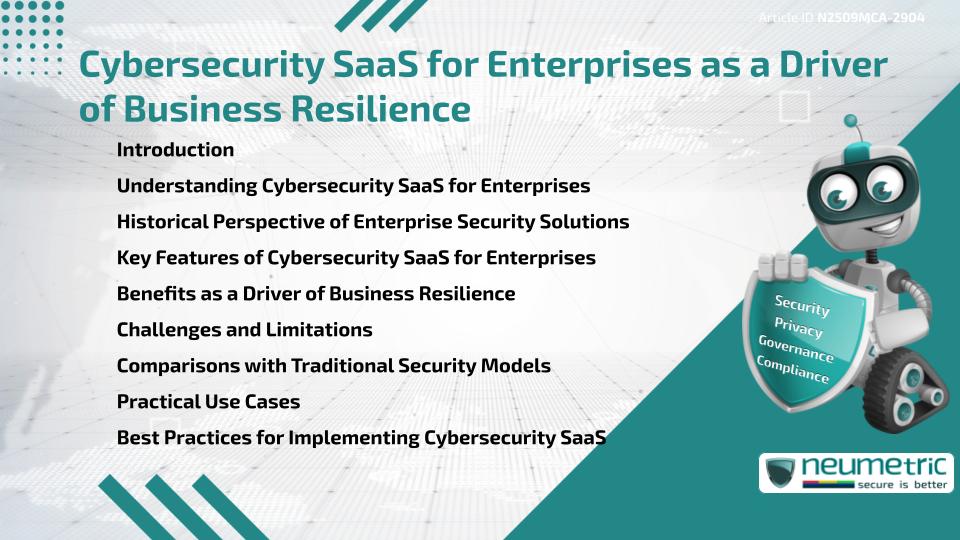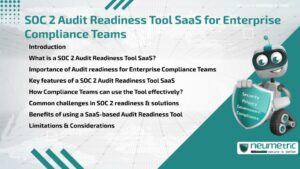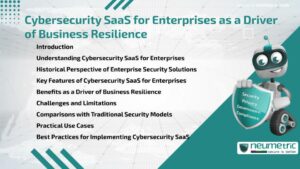Table of Contents
ToggleIntroduction
Cybersecurity SaaS for enterprises provides cloud-based security solutions that protect Organisations from evolving Threats while enhancing operational resilience. By offering services such as Threat detection, compliance monitoring & Data Protection through subscription models, SaaS security solutions reduce costs, scale easily & improve Governance. This article explores the concept, history, features, benefits, challenges, comparisons, use cases & Best Practices of Cybersecurity SaaS for enterprises.
Understanding Cybersecurity SaaS for Enterprises
Cybersecurity SaaS for enterprises refers to subscription-based, cloud-hosted security tools that manage & monitor enterprise Risks. Services include Endpoint Protection, intrusion detection, Vulnerability management & compliance monitoring. These platforms reduce the reliance on heavy in-house infrastructure & provide continuous updates to combat new Threats.
Historical Perspective of Enterprise Security Solutions
Enterprise security once relied on perimeter-based defenses like firewalls & antivirus tools. As cloud adoption expanded, traditional models proved insufficient against dynamic Threats. SaaS delivery transformed enterprise security by offering flexible, scalable solutions accessible from anywhere. Cybersecurity SaaS for enterprises emerged as a key enabler of resilience in cloud-driven business environments.
Key Features of Cybersecurity SaaS for Enterprises
Core features include:
- Real-time Threat detection & response
- Automated compliance reporting
- Integration with existing IT ecosystems
- Centralized dashboards for monitoring
- Scalable subscription models for growing enterprises
These features make Cybersecurity SaaS solutions practical & cost-effective.
Benefits as a Driver of Business Resilience
Cybersecurity SaaS for enterprises supports resilience by:
- Enhancing protection against cyberattacks
- Ensuring compliance with Global Standards
- Reducing operational costs with cloud-based delivery
- Supporting remote & hybrid workforces
- Building Stakeholder trust through strong Governance
Challenges & Limitations
Challenges include potential Vendor lock-in, Data Privacy concerns & dependency on Third Party providers. Smaller enterprises may struggle with integration complexities. Additionally, over-reliance on automation can overlook context-specific Risks requiring human oversight.
Comparisons with Traditional Security Models
Traditional models involve on-premise security infrastructure, requiring high capital expenditure & constant updates. In contrast, Cybersecurity SaaS for enterprises offers flexible subscription pricing, continuous updates & scalability. While traditional models may still serve highly regulated industries needing full control, SaaS solutions provide agility & cost-effectiveness for most enterprises.
Practical Use Cases
Cybersecurity SaaS for enterprises is valuable in industries like Finance, Healthcare & technology. Financial Organisations use SaaS security tools to comply with regulations like PCI DSS. Healthcare enterprises adopt them to safeguard Patient Data under HIPAA. Technology firms leverage SaaS for securing cloud-native applications & protecting Intellectual Property.
Best Practices for Implementing Cybersecurity SaaS
To maximize benefits, enterprises should:
- Assess Risk & compliance needs before selecting providers
- prioritise providers with Certifications & strong reputations
- Integrate SaaS tools with existing IT & compliance systems
- Train staff to use SaaS tools effectively
- Continuously review provider performance & emerging Threats
Following these practices ensures enterprises achieve resilience through SaaS adoption.
Conclusion
Cybersecurity SaaS for enterprises is more than a security solution-it is a driver of resilience. By enhancing protection, reducing costs & ensuring compliance, SaaS security tools help enterprises adapt & thrive in complex digital environments.
Takeaways
- Cybersecurity SaaS for enterprises enhances resilience & Governance.
- SaaS models reduce costs & scale easily compared to traditional systems.
- Challenges include Vendor lock-in, integration & Privacy concerns.
- Best Practices involve provider evaluation, integration & staff training.
FAQ
What is Cybersecurity SaaS for enterprises?
It is a subscription-based Cloud Security model offering tools like Threat detection, compliance monitoring & Data Protection.
Why is it important for business resilience?
It reduces Risks, enhances compliance & provides cost-effective, scalable security solutions.
How does it differ from traditional security models?
Traditional models rely on on-premise infrastructure, while SaaS offers cloud-based, continuously updated tools.
What industries benefit most from Cybersecurity SaaS for enterprises?
Finance, Healthcare & technology sectors benefit due to regulatory & Data Protection requirements.
What challenges come with adopting SaaS security solutions?
Challenges include Vendor dependency, integration complexity & Data Privacy Risks.
Can small enterprises use Cybersecurity SaaS effectively?
Yes, SaaS models are scalable & can be tailored to suit small, mid or large Organisations.
What Best Practices ensure success with SaaS security?
Clear Risk Assessment, careful provider selection, staff training & Continuous Monitoring.
Need help for Security, Privacy, Governance & VAPT?
Neumetric provides organisations the necessary help to achieve their Cybersecurity, Compliance, Governance, Privacy, Certifications & Pentesting needs.
Organisations & Businesses, specifically those which provide SaaS & AI Solutions in the Fintech, BFSI & other regulated sectors, usually need a Cybersecurity Partner for meeting & maintaining the ongoing Security & Privacy needs & requirements of their Enterprise Clients & Privacy conscious Customers.
SOC 2, ISO 27001, ISO 42001, NIST, HIPAA, HECVAT, EU GDPR are some of the Frameworks that are served by Fusion – a SaaS, multimodular, multitenant, centralised, automated, Cybersecurity & Compliance Management system.
Neumetric also provides Expert Services for technical security which covers VAPT for Web Applications, APIs, iOS & Android Mobile Apps, Security Testing for AWS & other Cloud Environments & Cloud Infrastructure & other similar scopes.
Reach out to us by Email or filling out the Contact Form…





